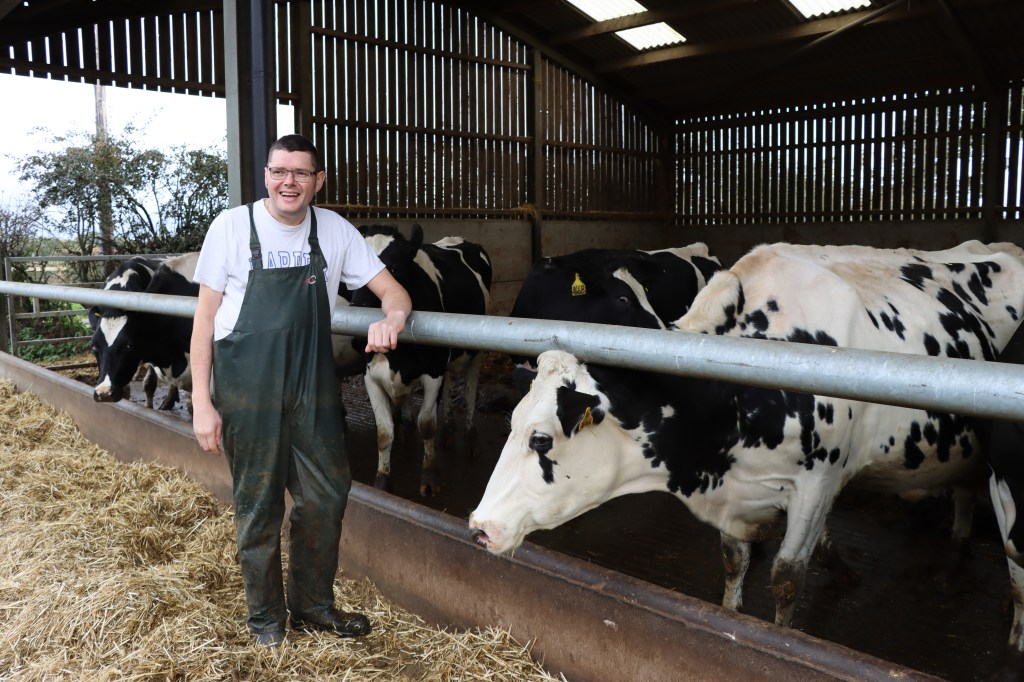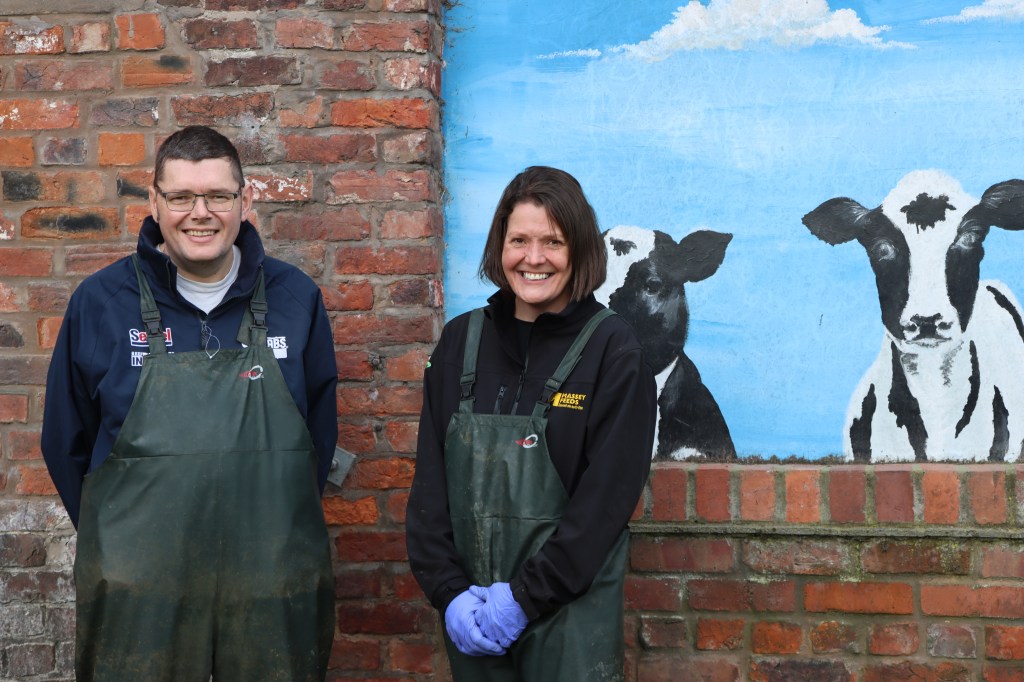Fertility and superior genetics have long been viewed as the key to successful farming. Andrew Rutter who farms alongside his family members, Emma Jones, Dennis and Rachel Hughes, at Clayhanger farm, has found great success by sticking to tight protocols and utilising a sexed and beef strategy to speed up the genetic progress of their herd.
The Power of Genomic Testing and Sexed Genetics
Operating an all-year-round calving herd of 400 animals, Andrew considers profit margin their most important factor, with milk yields of 10,200 litres a critical driver.
Just five years ago, the pregnancy rate at the farm was recorded at 16%, but the siblings’ tenacity combined with a strategic approach to sustainable pregnancy production, has seen that figure skyrocket to 34.2%.
Andrew said: “When I first came home (in 2018) we had a high type herd with a fairly low genetic merit,” explains Andrew. “So, I knew with the parent averages that I had, I could do a fairly good job of sorting the cows in terms of what I wanted to breed the next generation from.”
Achieving Sustainable Genetic Gains
As time went by the herd’s parent average tightened significantly, leading Andrew to explore genomic testing, via the GENEadvance® package. This enabled the farm to produce better cows faster through a tailored genetic strategy. Breeding the correct number of heifers for the milking herd and identifying surplus animals to breed to beef or sell, has resulted in permanent and cumulative genetic gain.
By genomic testing each of his animals, Andrew can accurately determine matings for cows and heifers based on individual genetic merit to maximise fertility. The genomic test can also highlight any animals that may carry hereditary haplotypes, so Andrew can manage genetically inherited conditions.
Identifying the best performing animals in the herd and breeding them to Sexcel®, semen, almost guarantees female offspring with high production. By breeding the highest genetic merit females to top performing sires with strong traits for Daughter Fertility and Calf Survival, strong fertility is practically assured.
Sexcel® is Genus ABS’ sexed genetics and is powered by innovative Intelligen™ technology. Sexcel® was released seven years ago and is the marketplace leader for being the most fertile sexed product available with over a 90% relative conception rate to conventional semen.
Overall, Andrew’s family herd is running on a 34.2 pregnancy rate. The maiden heifers bred to Sexcel® have a conception rate of 63% and animals in their first lactation have a 50% conception rate when bred with Sexcel®.
Referring to genomic testing in the herd, Andrew goes on to say; “I’m making more accurate decisions now. In terms of what we sell and what we breed, genetic progress is the next step really of how we’re going to improve the profitability here”.
Ranking all of their animals on genetic merit, the farm now breed the top performing three quarters of their heifers to Sexcel® sexed genetics, and the bottom quartile to Angus beef (NuEra™ Beef Genetics.) For the milking herd, the farm breed the top third to dairy, with the bottom two thirds to British Blue.
This strategy not only ensures that the viability of the herd remains intact, but has also led to the eradication of any calving difficulties typically associated with male births. Genomic testing also allows the farm to select more accurately for goal traits, including £PLI, EnviroCow and Feed Advantage, and knowing that the animals that they are producing are likely to yield more milk ensures marginal gains and compensatory effects.
Andrew explains more; “PLI is a really good starting point because it puts a good focus on health traits and fertility. The best way of generating milk sales is having fresh milk, so if we’ve got fresh cows, we’ve always got options. PLI is a really good benchmark”.
When Andrew first returned to his family farm, the herd was in the 65th percentile for £PLI, a score that is categorised as just below average in the UK. The changes that the Rutters introduced have ensured that the herd is now performing at a genetic level in the top 10% and their youngstock is in the top 1% of the national herd. The farm also produced a heifer which ranked in the top 40 in the UK for £PLI.

The sexed and beef strategy
The sexed and beef strategy that the farm employs contributes to overall efficiency with a focus on fertility. Angus beef calves are sold at ten days, allowing the Rutters to benefit from a beef calf cash crop and concentrate on their dairy operations.
We at Genus ABS have called the sexed and beef strategy the ‘Winning Game Plan’ because of the outstanding genetic progress and economic opportunities it brings.
Working closely with Reproduction Management Specialists, Andrew has implemented a clear breeding plan and strategy to proactively manage fertility. To support the very few animals that have had previous calving issues, have required calving assistance, or had twins, Presynch and Ovsynch are given to affected cows at 30 and 45 days.
Animals that are still not seen bulling after 60 days are then put forward to the vet. Ovsynchs are also used if a negative pregnancy diagnosis is recorded, and CIDRs when necessary; this careful observance ensures that fertility goals are maximised.
The Role of Nutrition and Reproductive Management
Feed also plays an important role in pregnancy production; good nutrition is essential to support hormonal regulation, ovarian function, and overall reproductive health.
“We try and feed maize all year round,” explains Andrew. “It’s good energy, the cows love it, it shows in the milk cheques and the results we see with fertility.”
Clayhanger Farm rely on weekly reports and KPIs to stay on track. Andrew explains more; “As well as management (KPIs), we need over seven pregnancies per week. So, I know that if I’m getting seven or eight plus pregnancies, we’re not going to be far off.”
Andrew said one of the most effective changes to their protocols has been having their herd pregnancy diagnosed by a vet weekly, as opposed to once a fortnight. This regular check helps the farm to monitor cows more frequently, diagnose twin pregnancies and recheck where necessary.
This focus on animal health and wellbeing also extends to routine foot trimming at 80 days and a couple of weeks pre dry off. Andrew is aware that if his animals are stressed or uncomfortable, their energies will not be focused on showing heat.
The same principle applies to the farm’s approach to udder health, with mastitis rates running at just 13% per annum.
“Mastitis and lameness directly impact fertility. Mastitis causes stress and lameness means they won’t show any signs of heat, making it difficult to develop a pregnancy. Even if she does show heat while lame, the chances of a viable pregnancy is significantly reduced.” Andrew said.
Driving Profit through Fertility
Like many other dairy farms, the goal at Clayhanger is to breed ‘invisible cows’, those which milk well, produce great yields, and require little to no intervention. Andrew likes to use the saying “turnover for vanity, profit for sanity”, an expression which is proving to be accurate for the partnership.
Ultimately, the team at Clayhanger Farm is driven by fertility because it drives profit.
Andrew explains: “Our bottom line is driven by pregnancies. We can’t do anything without them. Everything falls apart within just a couple of months if you haven’t got cows in calf.”
Want to find out more about the UK’s leading sexed product? Visit our website or contact your local Genus ABS representative.






